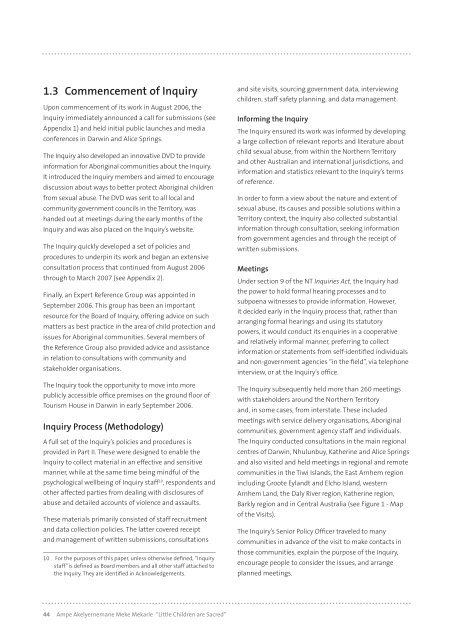bipacsa_final_report
bipacsa_final_report
bipacsa_final_report
Create successful ePaper yourself
Turn your PDF publications into a flip-book with our unique Google optimized e-Paper software.
1.3 Commencement of Inquiry<br />
Upon commencement of its work in August 2006, the<br />
Inquiry immediately announced a call for submissions (see<br />
Appendix 1) and held initial public launches and media<br />
conferences in Darwin and Alice Springs.<br />
The Inquiry also developed an innovative DVD to provide<br />
information for Aboriginal communities about the Inquiry.<br />
It introduced the Inquiry members and aimed to encourage<br />
discussion about ways to better protect Aboriginal children<br />
from sexual abuse. The DVD was sent to all local and<br />
community government councils in the Territory, was<br />
handed out at meetings during the early months of the<br />
Inquiry and was also placed on the Inquiry’s website.<br />
The Inquiry quickly developed a set of policies and<br />
procedures to underpin its work and began an extensive<br />
consultation process that continued from August 2006<br />
through to March 2007 (see Appendix 2).<br />
Finally, an Expert Reference Group was appointed in<br />
September 2006. This group has been an important<br />
resource for the Board of Inquiry, offering advice on such<br />
matters as best practice in the area of child protection and<br />
issues for Aboriginal communities. Several members of<br />
the Reference Group also provided advice and assistance<br />
in relation to consultations with community and<br />
stakeholder organisations.<br />
The Inquiry took the opportunity to move into more<br />
publicly accessible office premises on the ground floor of<br />
Tourism House in Darwin in early September 2006.<br />
Inquiry Process (Methodology)<br />
A full set of the Inquiry’s policies and procedures is<br />
provided in Part II. These were designed to enable the<br />
Inquiry to collect material in an effective and sensitive<br />
manner, while at the same time being mindful of the<br />
psychological wellbeing of Inquiry staff 10 , respondents and<br />
other affected parties from dealing with disclosures of<br />
abuse and detailed accounts of violence and assaults.<br />
These materials primarily consisted of staff recruitment<br />
and data collection policies. The latter covered receipt<br />
and management of written submissions, consultations<br />
10 For the purposes of this paper, unless otherwise defined, “Inquiry<br />
staff” is defined as Board members and all other staff attached to<br />
the Inquiry. They are identified in Acknowledgements.<br />
Ampe Akelyernemane Meke Mekarle “Little Children are Sacred”<br />
and site visits, sourcing government data, interviewing<br />
children, staff safety planning, and data management.<br />
Informing the Inquiry<br />
The Inquiry ensured its work was informed by developing<br />
a large collection of relevant <strong>report</strong>s and literature about<br />
child sexual abuse, from within the Northern Territory<br />
and other Australian and international jurisdictions, and<br />
information and statistics relevant to the Inquiry’s terms<br />
of reference.<br />
In order to form a view about the nature and extent of<br />
sexual abuse, its causes and possible solutions within a<br />
Territory context, the Inquiry also collected substantial<br />
information through consultation, seeking information<br />
from government agencies and through the receipt of<br />
written submissions.<br />
Meetings<br />
Under section 9 of the NT Inquiries Act, the Inquiry had<br />
the power to hold formal hearing processes and to<br />
subpoena witnesses to provide information. However,<br />
it decided early in the Inquiry process that, rather than<br />
arranging formal hearings and using its statutory<br />
powers, it would conduct its enquiries in a cooperative<br />
and relatively informal manner, preferring to collect<br />
information or statements from self-identified individuals<br />
and non-government agencies “in the field”, via telephone<br />
interview, or at the Inquiry’s office.<br />
The Inquiry subsequently held more than 260 meetings<br />
with stakeholders around the Northern Territory<br />
and, in some cases, from interstate. These included<br />
meetings with service delivery organisations, Aboriginal<br />
communities, government agency staff and individuals.<br />
The Inquiry conducted consultations in the main regional<br />
centres of Darwin, Nhulunbuy, Katherine and Alice Springs<br />
and also visited and held meetings in regional and remote<br />
communities in the Tiwi Islands, the East Arnhem region<br />
including Groote Eylandt and Elcho Island, western<br />
Arnhem Land, the Daly River region, Katherine region,<br />
Barkly region and in Central Australia (see Figure 1 - Map<br />
of the Visits).<br />
The Inquiry’s Senior Policy Officer traveled to many<br />
communities in advance of the visit to make contacts in<br />
those communities, explain the purpose of the Inquiry,<br />
encourage people to consider the issues, and arrange<br />
planned meetings.


